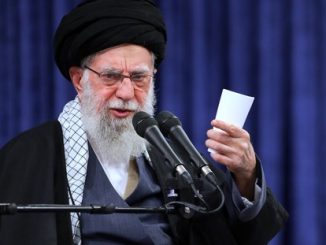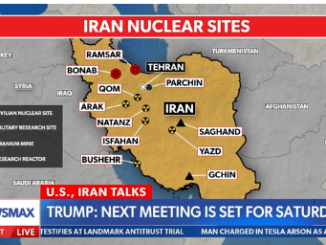
Syria’s interim president Ahmed al-Sharaa holds a joint press conference following a meeting with the Turkish president, at the Presidential Palace in Ankara, February 4, 2025. (OZAN KOSE / AFP)
| Published April 29, 2025
Syria and the Abraham Accords: A Complex Dance Toward Possible Peace
In a surprising development that could reshape Middle Eastern dynamics, reports have emerged suggesting that Syria may be exploring the possibility of joining the Abraham Accords — the historic series of agreements normalizing relations between Israel and several Arab nations.
At the center of the speculation is Ahmed al-Sharaa, a relative of former Syrian Vice President Farouk al-Sharaa, who is reportedly advocating for a new era of peace between Syria and Israel. According to The Times of Israel, Ahmed al-Sharaa is believed to be leading discussions about Syria potentially entering the Abraham Accords, which were initially brokered by the United States under the Trump administration in 2020. These accords have already seen countries like the United Arab Emirates, Bahrain, Morocco, and Sudan normalize relations with Israel.
Adding weight to the speculation, U.S. Congressman Ben Cline visited Syria recently and reported that Syrian officials expressed interest in joining the Abraham Accords — if certain conditions could be met. “They indicated a desire to eventually join the Abraham Accords under the right conditions,” Cline shared after his visit, as cited by All Israel News.
However, Syria’s public stance tells a different story.
Following the reports, Syrian officials promptly issued a strong denial. According to i24NEWS and Ynet, a Syrian Foreign Ministry statement declared that Syria remains opposed to joining the Abraham Accords while Israel continues its “occupation of Syrian territory,” referring to the Golan Heights, which Israel captured during the 1967 Six-Day War and later annexed — a move not internationally recognized.
“Syria’s position on the normalization agreements, known as the Abraham Accords, remains unchanged. Syria cannot be part of any agreement while part of its territory is under occupation,” the Syrian statement emphasized.
A Complicated Road Ahead
These conflicting signals — internal conversations versus official public denials — reflect the deep complexities facing Syria. The country, still scarred by years of civil war, faces economic collapse and international isolation. Aligning with Israel through the Abraham Accords could, theoretically, open new avenues for economic assistance, regional partnerships, and improved relations with the West.
Yet, historical grievances, national pride, and unresolved territorial disputes — particularly over the Golan Heights — pose massive hurdles. For Syria’s leadership, any move toward formal peace with Israel would require navigating a minefield of domestic backlash and regional skepticism.
Regional Reactions and Future Prospects
While some Middle Eastern leaders have embraced normalization with Israel as a pathway to greater economic and security cooperation, Syria’s case is distinct. Unlike the Gulf states, Syria has direct territorial disputes and a long history of warfare with Israel.
Still, analysts suggest that behind-the-scenes diplomacy could continue, especially if Syria calculates that economic survival and international rehabilitation outweigh the costs of continued enmity. Should Syria truly move toward joining the Abraham Accords, it would represent one of the most significant geopolitical shifts in the region in decades.
For now, however, the prospect remains highly uncertain. Officially, Damascus stands firm in its opposition — but the mere fact that conversations are reportedly happening signals that, in the Middle East, even the oldest conflicts are not immune to change.
Here’s a breakdown of the pros and cons of Syria potentially joining the Abraham Accords:
Pros of Syria Joining the Abraham Accords
-
Economic Opportunities:
-
Trade and Investment: Access to new economic partnerships, trade agreements, and financial aid from Israel and the Arab nations that have signed the Accords (e.g., UAE, Bahrain, Morocco).
-
Infrastructure Development: Potential for Israeli expertise in sectors like technology, energy, and agriculture to aid in Syria’s reconstruction after years of civil war.
-
-
Regional Security:
-
Strategic Alliances: Normalizing ties with Israel could bolster Syria’s position in the Middle East, offering potential security guarantees or alliances with Arab nations and Israel, which might deter regional threats.
-
Counterbalance to Iran: Joining the Accords could reduce Syria’s dependency on Iran, a country increasingly unpopular among certain Arab nations, and pave the way for greater regional cooperation.
-
-
International Legitimacy:
-
Reintegration into the International Community: Syria has been largely isolated in recent years due to its role in the civil war. Joining the Abraham Accords could pave the way for reintegration with the global community, including possible relief from sanctions.
-
Economic Aid and Support: Enhanced relations with Western and Arab countries could bring financial support for rebuilding Syria’s economy and infrastructure.
-
-
Geopolitical Shift:
-
Significant Diplomatic Achievement: Peace with Israel would mark a monumental shift in Syria’s foreign policy, positioning it as a more pragmatic player in the Middle East.
-
Potential Role in Peace Negotiations: Syria could become a mediator or key player in broader Middle East peace initiatives, improving its diplomatic standing.
-
Cons of Syria Joining the Abraham Accords
-
Domestic Backlash:
-
Public Discontent: Many Syrians view Israel as an adversary, especially because of the ongoing dispute over the Golan Heights. A peace deal might provoke strong opposition from the Syrian populace and various political factions.
-
Loss of Legitimacy for the Assad Regime: The Syrian government may face internal instability if it pursues such a controversial policy, potentially weakening President Bashar al-Assad’s hold on power.
-
-
Territorial Dispute:
-
Golan Heights Conflict: The key stumbling block remains the Golan Heights, which Israel controls. Syria’s acceptance of Israeli sovereignty over the area would be a major concession and would not sit well with Syrian nationalists and broader Arab sentiment.
-
-
Regional Isolation:
-
Opposition from Iran and Hezbollah: Syria’s alliances with Iran and Hezbollah complicate any shift toward Israel. These groups might perceive such a move as a betrayal and could undermine Syria’s regional standing, especially if their support is withdrawn.
-
Arab League and Regional Rivalries: While some Arab nations have embraced the Abraham Accords, others, particularly countries sympathetic to the Palestinian cause, might view Syria’s normalization as a betrayal of Arab solidarity.
-
-
Risk of Tension with Russia:
-
Balancing Relations with Moscow: Russia, a key ally of Syria, might not support a shift toward Israel, as it has historically advocated for a more pro-Palestinian stance and maintains complex relations with Iran and other actors in the region.
-
-
Uncertain Long-Term Benefits:
-
Questionable Sustainability: The economic and diplomatic benefits of joining the Accords may not materialize quickly or as expected, given the complexity of Syria’s post-war recovery and the potential ongoing instability in the region.
-
Continued Regional Instability: The situation in Syria remains volatile, and any move toward normalization could be undone if political or military conflicts flare up again.
-
Conclusion
Syria’s potential entry into the Abraham Accords represents a profound shift in the geopolitics of the Middle East. On the one hand, it offers the possibility of economic recovery, enhanced security, and greater international legitimacy, potentially improving Syria’s standing on the world stage after years of isolation and devastation. On the other hand, it comes with substantial risks, including domestic backlash, unresolved territorial disputes over the Golan Heights, and the delicate balancing act between Syria’s allies, such as Iran and Russia, and its potential new partners, like Israel and other Arab nations.
Ultimately, whether Syria decides to pursue peace with Israel through the Abraham Accords will depend on its ability to navigate these complex challenges. For now, the situation remains fluid, with behind-the-scenes discussions and public statements offering a glimpse of the potential for peace, but without clear commitment. The coming years will likely reveal whether Syria can reconcile its historical grievances with pragmatic diplomacy for the sake of rebuilding and stability.
SOURCES: THE TIMES OF ISRAEL – Ahmed al-Sharaa said to seek peace with Israel, eyes Syrian entry to Abraham Accords
ALL ISRAEL NEWS – Syria is interested to join Abraham Accords with Israel ‘under the right conditions,’ US Congressman says after visit
i24 NEWS – Syria says won’t join Abraham Accords as ‘Israel is occupying’ territory
YNET NEWS – Syria might join the Abraham Accords — that should make Iran very nervous





Be the first to comment